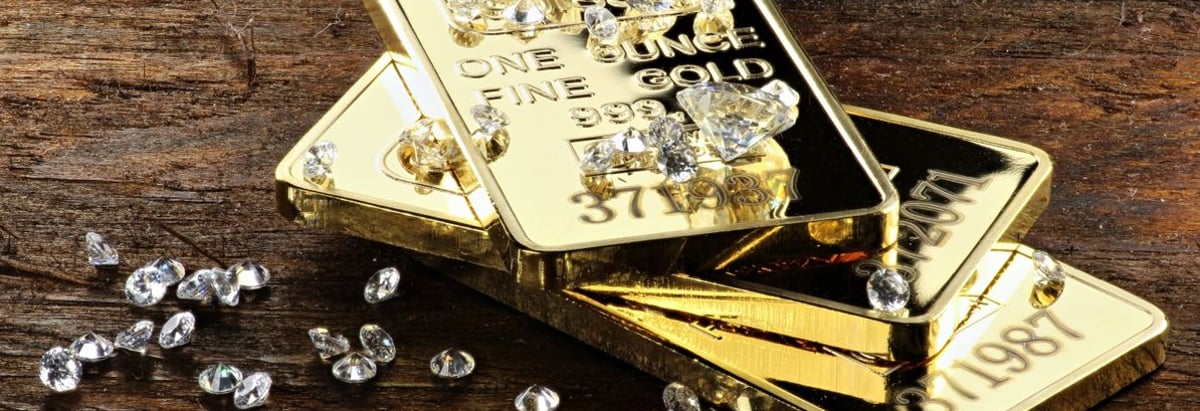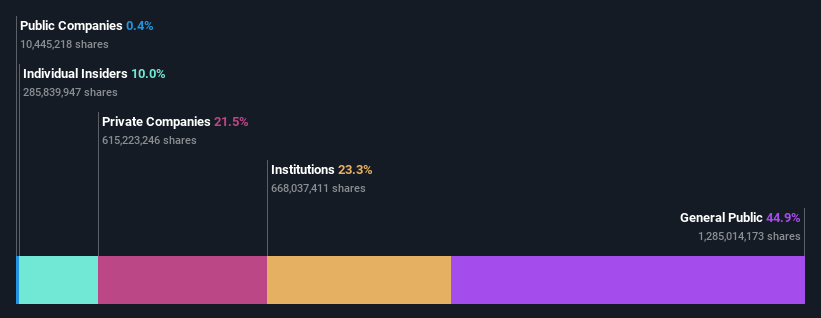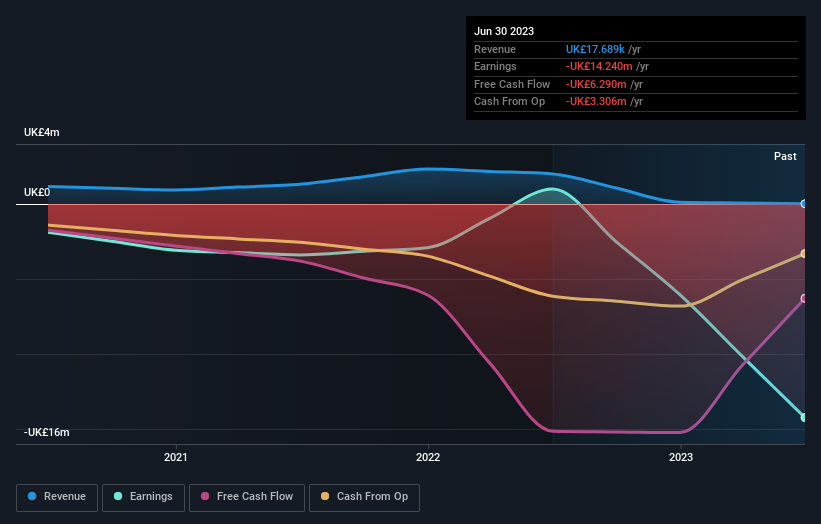- United Kingdom
- /
- Metals and Mining
- /
- AIM:EUA
Eurasia Mining Plc's (LON:EUA) market cap touched UK£109m last week, benefiting both retail investors who own 45% as well as institutions

Key Insights
- The considerable ownership by retail investors in Eurasia Mining indicates that they collectively have a greater say in management and business strategy
- A total of 11 investors have a majority stake in the company with 51% ownership
- Institutions own 23% of Eurasia Mining
Every investor in Eurasia Mining Plc (LON:EUA) should be aware of the most powerful shareholder groups. The group holding the most number of shares in the company, around 45% to be precise, is retail investors. Put another way, the group faces the maximum upside potential (or downside risk).
Retail investors gained the most after market cap touched UK£109m last week, while institutions who own 23% also benefitted.
In the chart below, we zoom in on the different ownership groups of Eurasia Mining.
View our latest analysis for Eurasia Mining

What Does The Institutional Ownership Tell Us About Eurasia Mining?
Institutional investors commonly compare their own returns to the returns of a commonly followed index. So they generally do consider buying larger companies that are included in the relevant benchmark index.
Eurasia Mining already has institutions on the share registry. Indeed, they own a respectable stake in the company. This implies the analysts working for those institutions have looked at the stock and they like it. But just like anyone else, they could be wrong. When multiple institutions own a stock, there's always a risk that they are in a 'crowded trade'. When such a trade goes wrong, multiple parties may compete to sell stock fast. This risk is higher in a company without a history of growth. You can see Eurasia Mining's historic earnings and revenue below, but keep in mind there's always more to the story.

Eurasia Mining is not owned by hedge funds. Queeld Ventures ltd is currently the largest shareholder, with 11% of shares outstanding. Deloan Investments Ltd is the second largest shareholder owning 9.6% of common stock, and Dmitry Suschov holds about 6.6% of the company stock.
A closer look at our ownership figures suggests that the top 11 shareholders have a combined ownership of 51% implying that no single shareholder has a majority.
While studying institutional ownership for a company can add value to your research, it is also a good practice to research analyst recommendations to get a deeper understand of a stock's expected performance. As far as we can tell there isn't analyst coverage of the company, so it is probably flying under the radar.
Insider Ownership Of Eurasia Mining
While the precise definition of an insider can be subjective, almost everyone considers board members to be insiders. The company management answer to the board and the latter should represent the interests of shareholders. Notably, sometimes top-level managers are on the board themselves.
I generally consider insider ownership to be a good thing. However, on some occasions it makes it more difficult for other shareholders to hold the board accountable for decisions.
Shareholders would probably be interested to learn that insiders own shares in Eurasia Mining Plc. It has a market capitalization of just UK£109m, and insiders have UK£11m worth of shares, in their own names. Some would say this shows alignment of interests between shareholders and the board, though we generally prefer to see bigger insider holdings. But it might be worth checking if those insiders have been selling.
General Public Ownership
The general public, who are usually individual investors, hold a 45% stake in Eurasia Mining. While this size of ownership may not be enough to sway a policy decision in their favour, they can still make a collective impact on company policies.
Private Company Ownership
Our data indicates that Private Companies hold 21%, of the company's shares. Private companies may be related parties. Sometimes insiders have an interest in a public company through a holding in a private company, rather than in their own capacity as an individual. While it's hard to draw any broad stroke conclusions, it is worth noting as an area for further research.
Next Steps:
I find it very interesting to look at who exactly owns a company. But to truly gain insight, we need to consider other information, too. For instance, we've identified 4 warning signs for Eurasia Mining (3 make us uncomfortable) that you should be aware of.
Of course this may not be the best stock to buy. Therefore, you may wish to see our free collection of interesting prospects boasting favorable financials.
NB: Figures in this article are calculated using data from the last twelve months, which refer to the 12-month period ending on the last date of the month the financial statement is dated. This may not be consistent with full year annual report figures.
Valuation is complex, but we're here to simplify it.
Discover if Eurasia Mining might be undervalued or overvalued with our detailed analysis, featuring fair value estimates, potential risks, dividends, insider trades, and its financial condition.
Access Free AnalysisHave feedback on this article? Concerned about the content? Get in touch with us directly. Alternatively, email editorial-team (at) simplywallst.com.
This article by Simply Wall St is general in nature. We provide commentary based on historical data and analyst forecasts only using an unbiased methodology and our articles are not intended to be financial advice. It does not constitute a recommendation to buy or sell any stock, and does not take account of your objectives, or your financial situation. We aim to bring you long-term focused analysis driven by fundamental data. Note that our analysis may not factor in the latest price-sensitive company announcements or qualitative material. Simply Wall St has no position in any stocks mentioned.
About AIM:EUA
Eurasia Mining
A mining and mineral exploration company, engages in the exploration, development, and production of palladium, platinum, rhodium, iridium, copper, nickel, gold, and other minerals in Russia.
Adequate balance sheet slight.
Market Insights
Community Narratives



